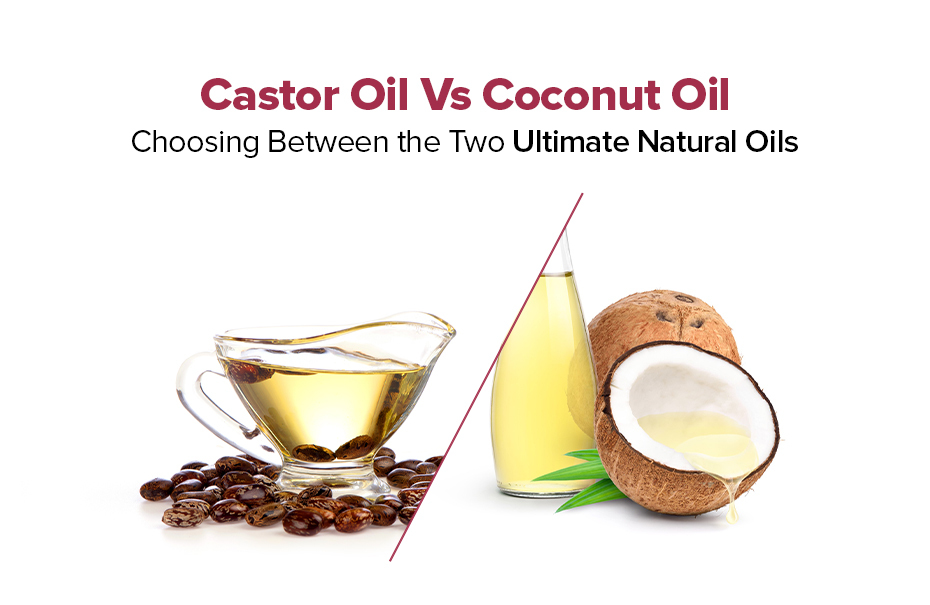Castor Oil Vs. Coconut Oil – Choosing Between the Two Ultimate Natural Oils

Castor Oil vs Coconut Oil, the comparison between two of the most versatile natural oils is like comparing a mirror because both are outstanding and equally beneficial for the skin and hair but, while coconut is known to be the best for skin, castor has an upper hand when it comes to hair. So, let’s explore in detail which one is best for what.
Castor Oil vs. Coconut Oil: Benefits & Best Uses Compared
Body Oils and its Importance
Since ancient times, people have used oil extracted from plants, seeds, fruits, kernels, or nuts for skincare and the practice is still prevalent. Rich in fatty acids, vitamins, and nutrients, body oils offer numerous health benefits to the skin. Several purposes are served by these various oils, each with its own texture, scent, and properties. Categorized based on their specific benefits, they are utilized accordingly to meet individual skincare needs.
1. Carrier Oils
Coconut, Jojoba, Sweet Almond Oil
2. Essential Oils
Lavender, Tea Tree, Citrus Oils (e.g., Orange, Grapefruit)
3. Specialized Oils
Argan, Rosehip, Olive Oil
4. Blended Oils
Body Massage Oils, Hydrating Body Oils
5. Multi-Purpose Oils
Bio-Oils (a combination of botanical oils), Dry Body Oils – (fast-absorbing oils designed to provide hydration without a greasy feel).
Body oils showcase versatility, suitable for direct application post-shower, in addition to bathwater, or as massage oils. When selecting, consider your skin type, preferences, and specific concerns for an optimal choice.
Benefits of body oils:
• Prevents dryness and flakiness, maintaining skin’s natural moisture balance.
• Regular use contributes to improved texture and a softer feel.
• Forms a protective barrier for moisture retention and overall skin health.
• Combats free radicals; reduces fine lines, and promotes skin elasticity.
• Ideal for relaxation, stress relief, improved blood flow, and a radiant complexion.
• Can be mixed with lotions for personalized hydration and scents.
Hair Oils and its Importance
Hair oils are crafted to enhance the health and aesthetics of hair, formulated with nutrients from diverse natural sources. Laden with fatty acids, vitamins, and other beneficial elements, these oils cater to the well-being of both the scalp and hair strands. Various hair oils, each with distinct properties, are tailored to address specific hair types and concerns.
Benefits of hair oils:
• Designed to nourish both the scalp and hair strands.
• Prevents split ends by providing moisture and sealing the hair cuticle.
• Reduces dryness, flakiness, and itchiness, balancing oil production.
• Massaging promotes blood flow, potentially supporting hair follicle health.
• Controls frizz, adds shine, and enhances manageability for a polished appearance.
• Certain oils shield hair from damage caused by styling tools and environmental factors.
Coconut Oil: The Versatile Elixir
Be it internal or external use, coconut oil tops when it comes to versatility. Derived from mature coconut meat or kernels, coconut is one of the most commonly utilized natural oils. Among its unique properties and health benefits is its saturated fat composition, including medium-chain triglycerides (MCTs). It is like a boon for skin, hair, as well as overall health.
Benefits for Skin:
• Lightweight texture, suitable for various skin types.
• Guards against oxidative stress, promoting a youthful appearance.
• Soothes irritated skin with its anti-inflammatory properties.
• Its lauric acid fights bacteria, potentially aiding acne treatment.
• Moisturizing and soothing effects may provide relief from sunburn.
Benefits for Hair:
• Improves moisture retention, reduces protein loss, and enhances manageability.
• Components improve scalp health, potentially encouraging hair growth.
• Low molecular weight allows deep penetration, preventing protein loss.
• Combats fungus, contributing to dandruff prevention.
• Shields hair from environmental damage, including pollution and UV rays.
Castor Oil: The Complete Package
The castor plant (Ricinus communis) produces castor oil, a versatile vegetable oil. Many traditional uses of this plant have been documented over the centuries, such as its medicinal, cosmetic, and industrial uses. About 85-95% of castor oil’s fatty acid composition is ricinoleic acid, which is known for its anti-inflammatory and antimicrobial effects. Castor oil also contains oleic acid, another fatty acid that contributes to its moisturizing properties, which altogether make castor a therapeutic oil.
Benefits for Skin:
• Rich emollient, locks in moisture, leaving skin soft and supple.
• Ricinoleic acid soothes irritation and reduces redness and inflammation.
• May aid acne treatment by combating bacteria on the skin.
• Regular use may diminish scars and blemishes over time.
• Protects against infection, and accelerates healing of minor cuts and scrapes.
• Fatty acids stimulate collagen and elastin production, reducing fine lines.
• Gently removes makeup and impurities without causing any damage to the natural oils.
• Deeply moisturizes and nourishes dry, flaky areas like elbows and knees.
• Promotes growth and thickness for healthier-looking eyelashes and eyebrows.
Benefits for Hair:
• Promotes blood flow to hair follicles, encouraging thicker and longer hair growth.
• High fatty acid concentration moisturizes and nourishes hair, reducing breakage.
• Regular application alleviates dryness, reduces dandruff, and soothes irritation for a healthier scalp.
• Forms a shield against environmental damage, sun exposure, and pollution.
• Moisturizing properties improve hair flexibility and strength, reducing split ends.
• Enhances texture and manageability with an intensive moisturizing treatment.
• Massaging into the scalp may stimulate hair follicles, promoting thicker, fuller hair.
Castor Oil Vs. Coconut Oil: The Comparison
When it comes to choosing an oil for your beauty regime, you must consider your specific needs, intended use, and suitability as both castor and coconut oil offer distinct properties and a variety of benefits for hair and skin. The following comparison is provided to assist you in determining which one will best suit your requirements.
For Skincare:
• Castor is a thicker oil, which might be too heavy for some skin types. It is more commonly used for specific skin concerns like dry patches or as a spot treatment.
• Coconut is known for its light texture. It is easily absorbed and is often used for overall body moisturization. It may be a better option for those with normal to dry skin.
For Hair:
• Castor oil tops as a hair oil as it promotes hair growth and strengthens hair.
• Coconut oil is good for conditioning and adding shine to the hair. It is good for regular use but when it comes to extreme hair problems, castor is a bit better than coconut oil.
Laxative Properties:
• Castor is historically known for its use as a natural laxative. Its consumption is recommended under the guidance of a healthcare professional.
• Coconut oil does not have significant laxative properties. On the contrary, it is used for cooking.
Anti-Inflammatory and Antimicrobial Properties:
• Castor contains ricinoleic acid, known for its anti-inflammatory properties. It may be beneficial for soothing irritated skin and addressing minor infections.
• Coconut also exhibits potential antibacterial and antifungal benefits on the skin.
Texture and Absorption:
• Castor is thicker and more viscous and may leave a slightly greasy feel on the skin.
• Coconut is lighter and easily absorbed, leaving the skin feeling soft and hydrated without a heavy residue.
Odor:
• Castor has a mild, earthy scent.
• Coconut has a pleasant, natural coconut aroma.
In summary, if you’re looking for a heavier oil with potential therapeutic benefits for specific skin concerns or hair growth, castor oil might be a good choice. If you prefer a lighter, versatile oil for overall skin and hair care, or for culinary purposes, coconut oil could be more suitable. Always perform a patch test before applying any new oil extensively, and consider your skin type and needs when making your choice.
Also Read: Castor vs. Coconut, Olive and Mineral Oil
FAQs
-
What sets castor oil and coconut oil apart from other natural oils?
Castor oil is distinguished for its profound moisturizing qualities and its ability to strengthen hair. Whereas, coconut oil also works on skin, hair, and various health issues.
-
How to choose between castor oil and coconut oil?
Consider your specific skincare needs. Castor oil is ideal for intense hydration and addressing dry skin, while coconut oil is suitable for everyday moisturization, especially for normal to oily skin.
-
Can castor oil and coconut oil be used for hair care?
Absolutely. Castor oil is beneficial for hair strength and thickness, reducing breakage and split ends. Coconut oil nourishes hair, adds shine, and improves overall hair health.
-
Can I use both castor and coconut oil in my beauty routine?
Yes, you can incorporate both oils into your routine based on your specific needs. For example, use castor oil for targeted hydration and coconut oil for overall moisturization.



